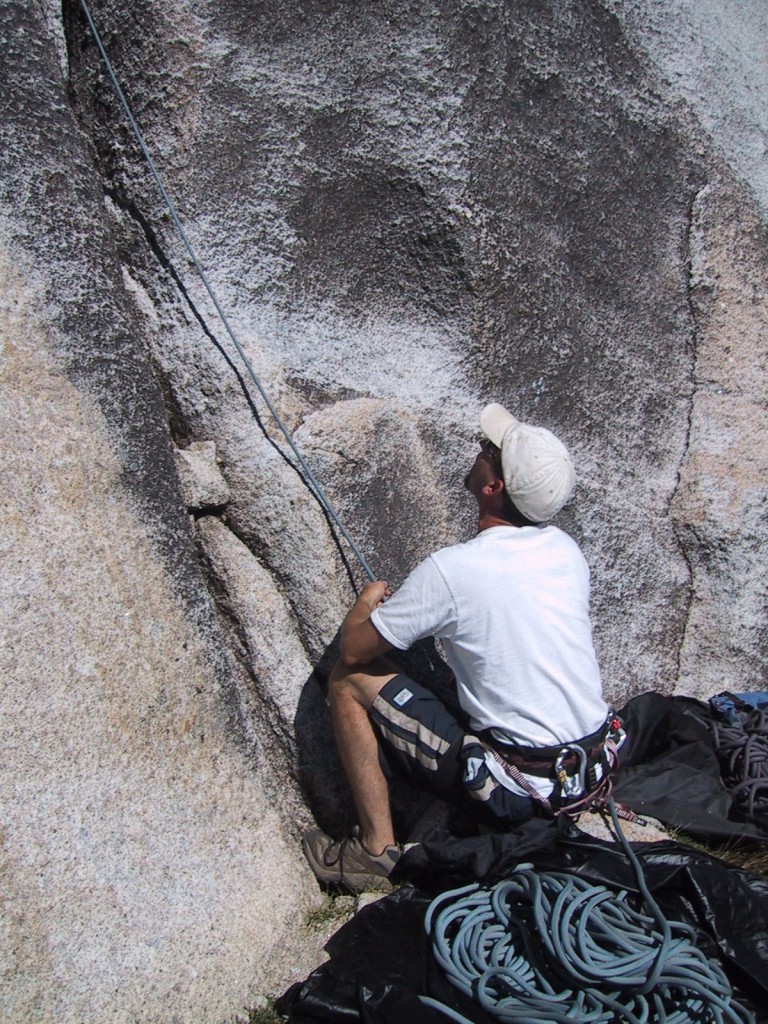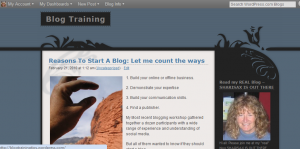 I love that question about writing the very first blog post: The thought was mine, as well as that of most of my blogging students.
I love that question about writing the very first blog post: The thought was mine, as well as that of most of my blogging students.
“I want my blog to be perfect, so I’d better take a whole lot of time to think about it, research it, draft it, write it, and revise it.”
Did the quote sound familiar?
Not good advice. Not the way to get going. Just plain, Not Necessary.
When I first began blogging, I wanted to “set the stage” with just the right post . . . but guess what?
It really doesn’t matter for countless reasons, and here are four:
- You’ll never get started if you don’t just Do It!
- Sorry to tell you this, but people just don’t know you are Out There yet, and unless you personally email a slew of friends [like I did], chances are you won’t get much of an audience at first.
- As wonderful and perfect as that first post could be, you do know that it moves further and further out of sight as you add new articles.
- AND, did I tell you, You’ll never get started if you don’t just do it.
All that being said, you CAN bring it back into view.
Simply put: Re-Post your first article in a year or so and explain to your audience the reasons that your article is still relevant. Below is that “First Post” on SHARISAX IS OUT THERE
Why you should Read or Re-Read My First Post
√ Some very basic Social Media terminology
√ A short history of my initiation into this revolutionary communication landscape
√ How you can create your own future
and now Post Number One . . .
To: My friends in the Blogosphere
From: Shari Weiss @sharisax on Twitter
Date: Thursday , April 23, 2009
, April 23, 2009
Re: My First Ten Things Memo Blog Post
FOLLOW ME . . . ALONG REVOLUTIONARY ROAD: Ten of the 1000’s of things I’ve learned in two months studying the Social Media Revolution/Evolution
How does one tell a story from the middle of a raging river [i.e., in medias res]? You just jump in the boat, I suspect, and start paddling.
As a journalist for more than thirty years and a marketing instructor for more than a decade, I’ve had a variety of valuable experiences learning to write, to sell, and to teach. But nothing has so excited and energized me as what is happening TODAY in what I refer to as the Social Media Revolution/Evolution.
The following is merely a place to start:
1. Social Media: After two months of talking about this social media phenomenon in my classes, one student was brave enough to ask, “So what is this thing, Social Media, that we’ve been spending so much time discussing?” Of course, anyone can go look up the phrase on Wikipedia and learn the consumer-generated definitions that are shaping how many of us are understanding the world.
My simplistic, starting-place answer is to take the word “media,” i.e., the vehicles we use to send a message from a sender to a receiver AND combine it with “social,” i.e., the environment in which people are living and working together. This is a New phrase/label, so what I believe we are talking about includes the New Methods being used and developed to have enhanced conversations with one another via enhanced technology, most specifically the Internet. Examples would include Twitter, Facebook, MySpace, Digg, StumbledUpon, Flickr, Yelp, and a whole host of others. Check out Brian Solis’ Conversation Prism:
2. Web 2.0 vs. Web 1.0: The term Web 2.0 was coined to describe all those extensions and further uses we have found for our technological connections via our computers. Where Web 1.0 allowed us to search for information and begin communicating via email, Web 2.0 has become a platform for community building and business growth. Web 2.0 marks the start of Social Media. So what will Web 3.0 look like?
3. Blogging: According to recent statistics, Technorati [Internet search engine for blogs], tracks 133 million blogs, and more are being produced each second – just as I’m doing here. Blogging has flattened the communication landscape. No longer do a few publishers, editors, and journalists control the flow of information to the public. Any one with an Internet connection can post his or her thoughts, opinions, and activities “out there” for everyone to read and comment upon.
4. Bloggers: Bloggers are the new influencers . . . or they can be. Many online writers simply post diary narratives on the Web for a host of reasons, which likely include the human need to be acknowledged. But hundreds, if not thousands, of bloggers are posting online content that gets read and spread – and what they say matters. Business organizations, both profit and nonprofit, have recognized the power of bloggers to market messages about products and services.
5. Micro-blogging and Twitter: Twitter has changed my life. Two months ago, a business acquaintance asked me to follow him on Twitter. Initially I didn’t get it. What did I care about what someone had for breakfast or what the traffic was like on the freeway. Then I discovered that “there are no rules” and that Twitter can be a host of different experiences, depending on how one chooses to use the technology.
During my first fumblings, I decided to use Twitter as a platform for my English students to send me substantive messages in only 140 characters – to teach lessons of clarity and conciseness. I was soon pleased to see a link to 100 Tips, Apps, and Resources for Teachers on Twitter.
Where did I find that link? On Twitter, of course, after I learned to use Twitter in a way that works well for me: I follow “Tweeple” [i.e. people with Twitter accounts] who are interested in topics of interest to me, e.g., future of marketing, future of PR, future of journalism, future of advertising, etc. My husband now calls me Tweetie Bird, since I’m so often online reading the blogs that offer more indepth facts, observations, and opinions on these subjects and more.
6. The New Rules of Marketing: It was on Twitter, of course, that I first learned of David Meerman Scott’s book The New Rules of Marketing & PR. As a marketing lecturer at San Francisco State University, I have felt compelled to address, acknowledge, and learn about Why? there need to be New Rules and Why? The Old Ones do not work any more.
One quote from DMS’s book: “Marketers must shift their thinking from the short head of mainstream marketing to the masses to a strategy targeting vast numbers of underserved audiences via the Web.” Brian Solis and Deidre Breakenridge expand on this in their recent book Putting the Public Back in Public Relations: “PR has begun to look less like a typical broadcast machine and more like a living, breathing entity capable of also participating in conversations with publics.”
7. The Future of Advertising: The death knell for newspapers has been sounded; young people don’t read them, and advertisers are pulling away. And that is only one medium suffering. Selling radio spots is not getting easier although radio listenership may be expanding because of Internet and satellite radio. The biggest changes are likely to be on Network TV. There is no longer a need for “mass marketing” on a “mass medium.” Large advertisers like Pepsi have admitted to misspending hundreds of millions of marketing dollars, and that probably indicates too much expense for TV commercials that are zapped via channel changing or TIVO fast-forwarding. Traditional forms of advertising will still be necessary to reach the large numbers of people who aren’t yet online [or not online very often], but figuring out how to successfully advertise online is where future strategies must be aimed.
8. Reverse-Engineering: This is a fascinating process to contemplate. Think about your goal and work backwards to make it happen. I’m reminded of the Silicon Valley slogan of the ‘90s: “You imagine it and we will build it.” I read a recent post by noted blogger Seth Godin whose paragraph for the day was titled “Imminent” and he began with this quote: “The one thing that will allow your business to get funded, or to get a business to business buyer to buy from you or a college to admit you is the sense that your success is imminent.” This is my understanding of the theory of “intention” in which you focus on the result you want – and it will come about.
9. Creativity: Amidst sea tides of change, the need for creative thinking remains constant. That requires recognizing that new ideas are healthy and need to be encouraged and embraced, not feared and dismissed. What has worked in the past can be twisted and turned and looked at in new ways, while brainstormers stay open to totally different thoughts that emerge and can provide exciting new solutions. Picasso said, “I am always doing that which I do not know how to do in order to learn how to do it.”
10. We do not go out to find ourselves; rather, we go out creating ourselves: Why am I starting this blog? Let me count the ways. First of all, I have learned so much in the last few months that I am compelled to share that knowledge and hear what others have to say. Second, I believe in the power of the individual to make significant contributions to the betterment of society. And third, as I’ve told some of my students and my new blogging buddies, my “intention” is to join the A-list bloggers.
[for the original post and original comments, click HERE]
If you’d like to add a LINK to your First Blog Post, please feel free to add it to the comment section below.
FURTHER READING FROM MY BLOG:
How to write that first blog post on WordPress
Beginner Blogger’s Workshop: What should I blog about?
Avoid these 9 blogging blunders
Use your blog to become the GO-TO source for information
To Blog . . . or Not to Blog — A good first question
How to start a blog: step-by-step
